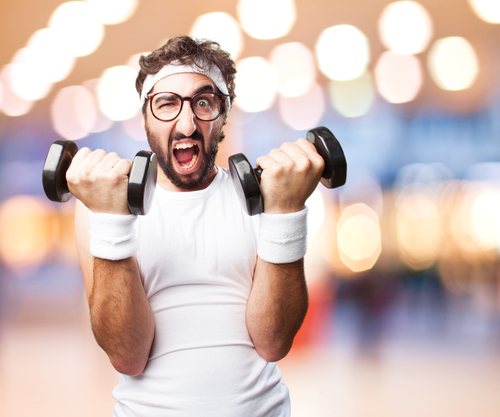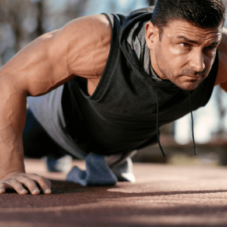Vitality
Coffee & Deadlifts: How Caffeine Can Boost Performance in the Gym
Black metal + black coffee + deadlifts; are there three finer things in life?
Table of Contents
Why is coffee so great at boosting performance? Mechanism of Action
Caffeine is a stimulant of the Central Nervous System and its effect is similar but not as strong as amphetamines. It is used as an ergogenic aid by both aerobic and anaerobic athletes. In aerobic exercises, it increases endurance by using as fuel the fatty acids of the fat mass or the intramuscular fat. The bigger use of fat leads to slower use of the stored glycogen and to slow appearance of fatigue (1).
On the other hand, when talking about anaerobic, short-duration, high-intensity training, caffeine seems to increase strength. This can be explained by caffeine’s actions on the Central nervous and neuromuscular systems. In the Central Nervous System, it delays fatigue, increases the activation of muscle groups, and reduces pain (2). Moreover, caffeine causes increased electric stimulation and muscle contraction.
Caffeine and athletic performance
When comparing trained and untrained individuals, caffeine improves only the performance of the trained ones, while it has almost no effect on the untrained people (3). On the other hand, people who were habituated to caffeine don’t seem to experience any muscle strength or endurance benefit after consuming high acute doses of caffeine(4).
Caffeine has been shown in plenty of studies that it is beneficial for speed endurance exercise, ranging in duration from 1-3 minutes. Additionally, there are studies showing that caffeine affects isometric maximal force and enhanced muscle endurance for lower body musculature (3).
In a 2011 published study, researchers examined the effect of caffeine supplementation of 5 mg /kg of bodyweight vs. placebo on bench press exercise to failure and the mood state response pre to post-exercise. They concluded that caffeine enhances performance in short-term, resistance exercise to failure and can potentially enhance the mood state response to exercise compared to a placebo (5).
In a (2018) meta-analysis of ten studies on the strength outcome and ten studies on the power outcome regarding caffeine supplementation, researchers concluded that they noticed “significant ergogenic effects of caffeine ingestion on maximal muscle strength of upper body and muscle power“ (6).
When to drink coffee
There are studies showing that circadian rhythm has a role in performance, and some demonstrate that performance is better in the afternoon compared to the early morning. Additionally, according to a (2019) study, muscular abilities, including strength, appear to peak in the evening hours (7).
Considering the stimulatory role of caffeine, it can be a potential method of mitigating the performance decrement seen in the morning hours. Likewise, Caffeine has been shown to mitigate the negative effects of jet lag on performance and can potentially assist in the retraining of circadian rhythm following a large time change (8).
On the other hand, there are recent studies (2019) showing that there is no effect on the time of day on caffeine echogenicity. Specifically, caffeine supplementation did not prevent the reduction in performance in the morning or improve performance in the afternoon (7).
Another study showing that the consumption time of caffeine doesn’t affect performance was conducted by Sweeney in 2016 among participants performing 3-km cycling performance in the morning or evening. She concluded that “the effect of the caffeine rinse had no difference between times of day” (9).

Please drink (coffee) responsibly!
Although it may have its uses for performance and recovery, on the flip side, caffeine can also cause sleep problems, headaches, dehydration, and anxiety. In addition, habitual caffeine users don’t seem to benefit significantly from high doses of caffeine, thus is no reason to try big doses. More is not always better and this is sure when we talk about caffeine. Enjoy your coffee in moderate quantities to manage to improve your performance with safety, without losing your sleep or triggering your nerves!
💬 Something on your mind? Share your thoughts in the comments. We love hearing from curious minds.
📩 And while you’re here, join our newsletter for more smart stuff (and secret perks)!
References:
(1) Tarnopolsky, M.A., Caffeine and creatine use in sport. Annals of Nutrition and Metabolism, 2010. 57(SUPPL. 2): p. 1-8.
(2) Tarnopolsky, M.A., Effect of caffeine on the neuromuscular system – Potential as an ergogenic aid. Applied Physiology, Nutrition and Metabolism, 2008. 33(6): p. 1284-1289.
(3) Davis, J.K. and J.M. Green, Caffeine and Anaerobic Performance. Sports Medicine, 2009. 39(10): p. 813-832.
(4) Wilk, M., Krzysztofik, M., Filip, A., Zajac, A. and Del Coso, J., 2019. The Effects of High Doses of Caffeine on Maximal Strength and Muscular Endurance in Athletes Habituated to Caffeine. Nutrients, 11(8), p.1912.
(5) Duncan, M. and Oxford, S., 2011. The Effect of Caffeine Ingestion on Mood State and Bench Press Performance to Failure. Journal of Strength and Conditioning Research, 25(1), pp.178-185.
(6) Grgic, J., Trexler, E., Lazinica, B. and Pedisic, Z., 2018. Effects of caffeine intake on muscle strength and power: a systematic review and meta-analysis. Journal of the International Society of Sports Nutrition, 15(1).
(7) Lopes-Silva, J., Santos, J. and Franchini, E., 2019. Can caffeine supplementation reverse the effect of time of day on repeated-sprint exercise performance?. Applied Physiology, Nutrition, and Metabolism, 44(2), pp.187-193.
(8) Pickering, C. and Grgic, J., 2019. Caffeine and Exercise: What Next?. Sports Medicine, 49(7), pp.1007-1030.
(9) Sweeney, K., 2016. Caffeine Mouth Rinsing In The Fed State Does Not Enhance 3-Km Cycling Performance In The Morning Or Evening. [online] JMU Scholarly Commons.





